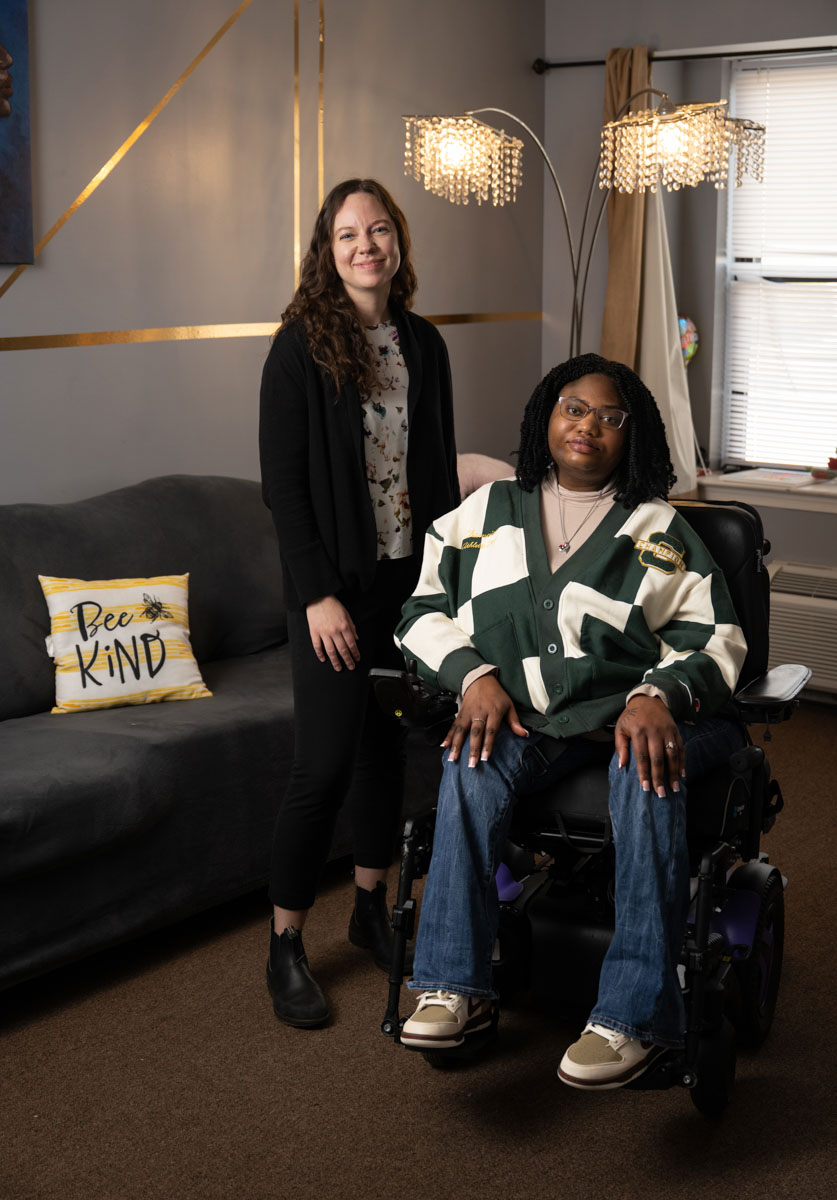Samantha Allen

When Samantha Allen was told she owed $30,000 to the DC Department of Employment Services (DOES), she was stunned. Without warning or explanation, she was left with no answers and a massive debt hanging over her head.
“I’m no lawyer, but I knew something wasn’t right,” Ms. Allen said. “I felt like my back was against the wall.”
Through a frustrating series of phone calls with DOES, Ms. Allen learned that the agency wanted her to repay all the unemployment benefits she had received during COVID-19, claiming that she had never been eligible for those benefits, despite her clear need.
Ms. Allen has muscular dystrophy, a genetic disease that causes muscle weakness and limited mobility, worsening over time. Her younger sister has the same condition, and Ms. Allen is her legal guardian and full-time caregiver. As the COVID-19 pandemic hit, Ms. Allen lost her part-time job in concessions at Audi Field when the soccer stadium closed. With her sister’s school moving online, her responsibilities grew. Both were at high risk of complications from COVID-19 and had to put life on pause.
To stay afloat, Ms. Allen applied for Pandemic Unemployment Assistance (PUA) and was approved. She received benefits for a year and a half, and life began to return to normal. Then in 2024, her tax return was seized. DOES claimed that it sent her a notice about the overpayments claim, but Ms. Allen — who is meticulous with her mail and record keeping — never received it.
Samantha Allen
“It was shocking. I did everything they told me to do. I filed my paperwork, I sent my records, I followed up. But they made it seem like I had done something wrong,” she said. “They’re supposed to help you figure this out, but they were being rude, not responding, and I didn’t know what to do from there.”
After being ignored, hung up on, and hitting dead ends with DOES, Ms. Allen found Legal Aid DC. After hearing Ms. Allen’s story, Lisa Meehan, a Public Benefits Staff Attorney at Legal Aid, was confident they had a strong case.
A Last-Minute Win
Unfortunately, Ms. Allen’s situation is not uncommon.
“It’s just an indication of the expectations that agencies put on people who are seeking these benefits,” Lisa said. “They make them jump through all these hoops and have everything perfect, but they don’t put the same expectations on themselves.”
Lisa filed an appeal on Ms. Allen’s behalf and went back and forth with DOES trying to convince them that they had made a mistake.
“One, she never got notice. Two, they wouldn’t listen to her when she told them there had been a mistake, and three, they were wrong to find her ineligible in the first place,” she said.
Lisa and Ms. Allen collected piles of evidence — medical records, tax returns, employer correspondence, and records from her sister’s school — all of which proved she qualified for PUA benefits.
“Ms. Allen was so organized. She did everything right, and she kept track of everything,” Lisa said.
Lisa and Ms. Allen prepared for a hearing in May 2025. Ms. Allen was ready to testify and to be cross-examined.
“I was looking up the dates to make sure I could answer their questions as honestly and accurately as possible, and give them the truth,” Ms. Allen said. “All I wanted was a chance to tell my story, and for them to just see where I was coming from. To know my story and to hear me.”
Around 5 p.m. the evening before the hearing, DOES attorneys called Lisa to tell her they were issuing a new decision and had determined that Ms. Allen was eligible for benefits. Still, she wanted to be certain that the paperwork was in order. So, the next morning, Lisa and Ms. Allen got ready for court anyway. A MetroAccess ride was already scheduled to take Ms. Allen to the courthouse.
With suits on and documents in hand, Lisa spoke with DOES again and confirmed that they were issuing a clear notice that Ms. Allen had been eligible for the benefits she had received all along. Lisa withdrew the case, and Ms. Allen was relieved of a $30,000 debt. And after more follow-up, DOES repaid Ms. Allen for the tax return that was seized.
Ms. Allen said working with Lisa made her feel like she had someone to listen to and advocate for her.
“It was a pleasure working with Ms. Lisa. She helped me understand what was happening, but she also made me able to be heard,” Ms. Allen said. “There was no way that we could have had this positive outcome without her. I was so happy, I cried.”




